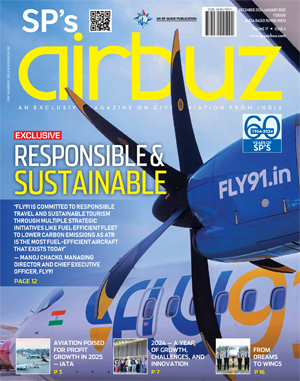With the market recovering, Lufthansa Technik Services India sees strong growth

Despite the global downturn in 2008 Lufthansa Technik Services set up its Indian unit in Bengaluru. In an interview with SP’s AirBuz, Tim Butzmann, Chief Executive Officer, LTS India states that the company’s financial position remains sound although some business plans had to be postponed.
SP’s AirBuz (SP’s): Setting up Lufthansa Technik Services India (LTSI) in the midst of recession in 2008, how has the subsidiary negotiated the times and is it on course?
Tim Butzmann (Butzmann): LTSI has some long-term agreements in place which has ensured a comparatively steady flow of revenue even during recession. For those parts of the business that were actually affected by recession, LTSI reacted very swiftly by downsizing wherever necessary. LTSI also managed to develop a new line of business by providing warehousing and logistics services to Indian carriers and thus ensuring utilisation of capacities that could not be reduced in the course of the mentioned downsizing of activities.
Hence, LTSI’s financial position remains sound though certain business plans had to be postponed. LTSI has maintained its position in the market and is all set to participate in development, which is now driven by the recovery of the aviation industry in India.
SP’s: Could you explain how the regional component pool and component service for Airbus aircraft functions?
Butzmann: There is a stock of aircraft material stored in Bengaluru. Indian carriers can access this pool of material, achieving economies of scale by sharing of stock. Airlines pay a fee per flight hour for the right to access this stock. This fee is more predictable and the total cost for the airline is substantially lower than that for a stock owned by the airline itself and used exclusively.
Additionally, the cost for the pool access is directly related to the actual utilisation and hence the revenue generated by the airline’s aircraft.
Lufthansa Technik AG/Germany had invented the model years ago and is servicing about 2,000 aircraft globally. Extending the model to India as one of the fastest growing areas of the world combines economies of scale with logistic advantages generated by local presence.
SP’s: What kind of maintenance, repair and overhaul (MRO) operations is Lufthansa Technik Services India, into? Is it restricted to providing materials management and spares for its customers?
Butzmann: At present, there is no MRO work performed by LTSI in Bangalore. The company focuses on provision of spare parts and the related logistics and customer services as well as required financing for this.
SP’s: What is your interpretation of the MRO market in India and how does Lufthansa Technik position itself? Will LTSI’s reach go beyond India and South East Asia? What about the Middle East?
Butzmann: MRO in India is still substantially affected by regulatory and fiscal environment. Hence, the development of MRO workshops and aircraft hangars still lags behind other regions. There is a certain risk that MRO activities in other countries in the vicinity will set their claims before the industry has gained sufficient strength in India itself. Hence, LTSI focuses on areas for which local presence is the crucial success factor. At the same time, LTSI is investigating possibilities to serve as a hub for supply of other countries in South and South East Asia. In the Middle East, Lufthansa Technik Group is developing separate activities.
SP’s: What has been the growth of LTS India? What kind of capacity utilisation exists?
Butzmann: LTSI has witnessed reasonably steady business during recession. Capacity utilisation has been reasonable if not quite up to the initial expectations. With the market recovering, LTSI sees a strong growth story, both by way of new customers and new business models that are implemented.
SP’s: What new service offerings is LTSI looking in India and South East Asia?
Butzmann: LTSI aims at an increasing integration with customers spare parts supply chain. Warehousing and logistics solutions are to be extended and increased partnering with airline customers in the area of material management is considered worthwhile for making use of synergies. Also line maintenance support, engineering and component reliability services will fit seamlessly into the current offering.
SP’s: Has the setting up of a unit in India brought down the percentage cost of MRO operations and are the clients here seeing those benefits?
Butzmann: The unit in India substantially reduces airline customer’s requirement for keeping own spare part inventory. This has an immediate impact on the customer’s balance sheet and cost of financing which typically forms one of the biggest parts in operating an airline.
SP’s: Could you give examples of the benefits clients have had with regard to quick turnaround time in MRO, from the pre-LTSI days?
Butzmann: In the pre-LTSI days, the material was typically supplied from Germany. Now, there is one or at most two flights from Germany to major destinations within India and the transportation time is nine hours. Any given destination within India can be reached within a maximum duration of 2 hours 30 minutes from Bengaluru and typically there are five or more connections a day. This obviously enables significant advantages for flexible and quick supply of our airline customer’s needs.





